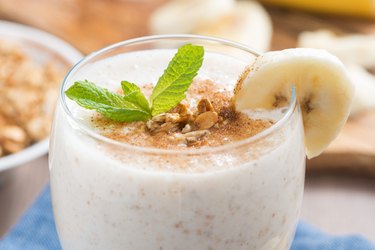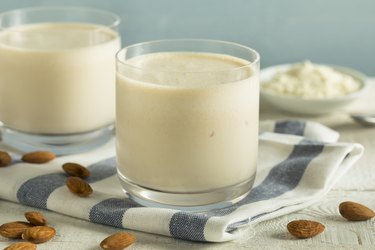
Weight loss is a concern during cancer treatments like radiation and chemo because side effects can include nausea, appetite loss and painful swallowing. To gain or maintain weight during this difficult time, people with cancer can try adding high-calorie, protein-rich beverages to their diet.
"Cancer and cancer treatments can lead to poor appetite, nausea, taste and smell changes, feeling full too quickly and difficulties digesting food," explains Rachel Dudley, RD, a clinical dietitian at the Dan L. Duncan Comprehensive Cancer Center in Houston. And not getting proper nutrition during treatment puts a person with cancer at risk for weight and muscle loss, poor energy and dehydration, she adds.
Video of the Day
Video of the Day
The best way to prevent weight loss is to eat well at every meal, but many people with cancer find they're unable to dine the way they used to. To make eating more tolerable — and tasty — during cancer treatments, consider drinking your calories. The National Cancer Institute suggests liquids like smoothies, juices and soup when solid foods are less than appealing. "Ready-to-drink oral supplements and shakes are often an easy and well-tolerated way for people in cancer treatment to increase calorie and protein intake throughout the day," confirms Dudley.
Not sure which kind is best? "A dietitian can help you determine if you need an oral nutritional supplement and which ones may be right for you," says Dudley.
Here's more about weight gain beverages when dealing with cancer, including some brand names and tasty ways to prepare them.
1. Meal-Replacement Drinks
When you're undergoing cancer treatment, you may find it easier to tolerate small sips of beverages throughout the day rather than eating three bigger meals, per the Mayo Clinic. If that's the case for you, then you may want to try energy-dense meal replacements, also called ready-to-drink oral nutritional supplements, which are beverages fortified with additional calories, protein, vitamins and minerals, explains Dudley.
Look for liquid meal replacements formulated to promote weight gain, and keep in mind that these drinks are not all created equal. "For example, some supplements contain high amounts of protein but sacrifice on the calories," Dudley says. "But people who are struggling to eat well and maintain their weight while on chemo should look for supplements that have a good ratio of calories and protein."
In general, a supplemental beverage should contain at least 250 calories and 15 grams of protein, though there are some oral nutritional supplements on the market that contain more than 500 calories per serving, she adds.
When it comes to ready-to-drink oral brands, two of the most common products are Ensure and Boost, says Dudley. "Both products come in several varieties and different flavors that would be suitable for people undergoing cancer treatment," she adds.
Read more: The Best Meal Replacement Shakes for Women

2. Fruit Smoothies
The beauty of smoothies is that you can include key nutrients as well as delicious add-ins, per the Cleveland Clinic. The result: An appealing beverage that's packed with ingredients for maximum weight gain during cancer treatments. "Smoothies often require more effort to make but are good options for those who do not like the taste of pre-made supplements or prefer to have more control over what they are consuming," points out Dudley.
Some cancer treatments to the head and neck can cause mouth pain, throat pain and swallowing or chewing difficulties, but a cool homemade smoothie may soothe a sore throat while adding extra calories, protein, vitamins and minerals. "Fruits and vegetables can be combined in smoothies with whole milk or whole-milk yogurt, ice cream, protein powder or even pre-made supplements," says Dudley.
Get the Recipe: Green Protein Smoothie
If you're having trouble digesting dairy products due to lactose intolerance related to antibiotics or radiation, smoothies can be blended with yogurt or ice cream made with soy, rice, almond or coconut milk. "Ingredients like peanut butter (or other nut butters), ground flax or chia seeds, nuts, oats and avocado can also be added to further increase the calorie content of smoothies," says Dudley.
Kristi King, MPH, RD, a senior dietitian at Texas Children's Hospital in Houston, recommends a smoothie that's full of protein and antioxidants to help fight free radicals in the body, and offers the below recipe. "I love this recipe because you can mix it up, adding protein powder or nut butter — or if your stomach is upset, you can try a little fresh grated ginger," she says. This recipe combines bananas, berries and leafy greens for a drink that's full of potassium, vitamins A and C, fiber and iron.
Banana-Berry Smoothie
Combine 1 cup of milk or almond milk, 1 banana or ½ mango, ½ cup frozen berries, ½ cup of romaine or spinach and ¼ cup of Greek yogurt and blend until smooth.
3. Protein Shakes
Ready-made protein shakes are similar to oral nutritional supplements, though you can also purchase protein powders to blend into the smoothies or milkshakes you create at home.
Supplements made from soy beans, rice, egg whites or whey — a milk-based protein — are the most common protein powders available. In addition to Boost and Ensure, other protein options to consider include Kate Farms and Orgain, says Dudley. "These would be suitable for vegans or vegetarians as they are plant-based brands."
Or if you're looking for more shake or smoothie recipes, Dudley recommends these websites: the Oncology Dietetics practice group page, which is part of the Academy of Nutrition and Dietetics, the American Cancer Society and CURE magazine.

4. Fortified Milk
"Fortified milk is milk that has extra amounts of certain vitamins or minerals added to it," explains Dudley.
Most milk sold in the United States is routinely fortified with vitamins A and D, but some manufacturers also add omega-3, folic acid, iron or zinc. And there are non-dairy milks, like soy or almond milk (Blue Diamond and Silk are just a couple of brands), that are often fortified so they have similar nutrients as found in cow's milk.
"While fortified milk may not help specifically with weight gain in people undergoing cancer treatments, it can help meet vitamin and mineral needs," says Dudley. "And fortified whole milk can also be added to homemade smoothies and protein shakes to help increase the calorie content of these beverages and aid in weight gain."
Was this article helpful?
150 Characters Max
0/150
Thank you for sharing!
Thank you for your feedback!
Is this an emergency? If you are experiencing serious medical symptoms, please see the National Library of Medicine’s list of signs you need emergency medical attention or call 911.